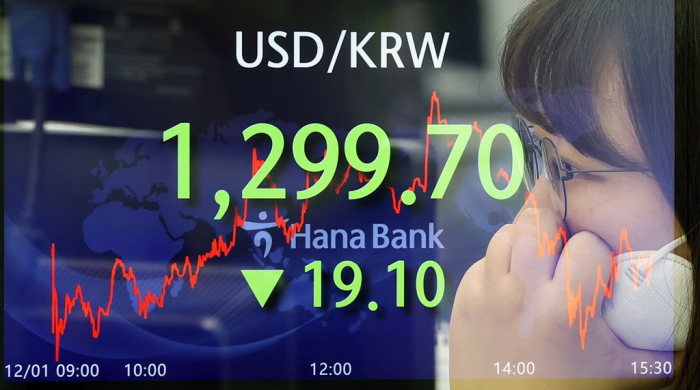Foreign exchange
Korea won near 5-mth high as Powell signals slower hikes
Government bond yields also fell as the BOK is expected to moderate its tightening pace, following Fed
By Dec 01, 2022 (Gmt+09:00)
2
Min read
Most Read
LG Chem to sell water filter business to Glenwood PE for $692 million


KT&G eyes overseas M&A after rejecting activist fund's offer


Kyobo Life poised to buy Japan’s SBI Group-owned savings bank


StockX in merger talks with Naver’s online reseller Kream


Meritz backs half of ex-manager’s $210 mn hedge fund



The South Korean won currency hit a near 5-month high on Thursday as US Federal Reserve Chairman Jerome Powell suggested a slowdown in its tightening pace, easing concerns over wider interest rate differentials between the two countries.
The won appreciated as much as 1.9% to 1,294.6 per dollar, its strongest level since July 5, as investors reduced bearish bets on the local currency in the domestic foreign exchange market.
Powell said on Wednesday that lower rate hikes are likely ahead, defying market expectations of more hawkish comments.
“It makes sense to moderate the pace of our rate increases as we approach the level of restraint that will be sufficient to bring inflation down,” Powell said. “The time for moderating the pace of rate increases may come as soon as the December meeting.”
The remarks prompted views that the US central bank may have significantly shifted its hawkish stance, hurting the dollar overall. The greenback came under further pressure from data showing that consumer prices in the European Union rose 10% in November from a year earlier, falling short of a forecast of a 10.4% increase.
The won had been hampered by the Fed’s strong determination to fight rampant inflation in the US and worries about a slowdown in Asia's fourth-largest economy. On Sept. 28, the South Korean unit depreciated to as weak as 1,442.2 versus the dollar, the softest since the 2008-09 global financial crisis.
The local currency is expected to appreciate further, although the downturn in the local economy may cap its upside, analysts said. China also took measures to ease some restrictions on COVID-19, which will improve South Korea’s exports to its largest overseas market and support the won, amid mass protests against the country’s strict policy to contain the pandemic.
“The won is likely to maintain its upside momentum against the dollar despite volatility around the current level,” said Kim Seung-hyuk, an analyst at NH Futures.
BOK TO MODERATE RATE HIKE PACE
The Fed’s stance on a slower tightening may prompt South Korea’s central bank to moderate its rate hike pace as the economy loses steam, analysts said.
The won’s rebound is also likely to alleviate the Bank of Korea’s concerns over inflation as it often lowers import prices, they added.
Reflecting such expectations, South Korea’s government bond yields fell across the board. The highly liquid three-year debt yield fell 3.9 basis points to 3.633% and the five-year bond yield slumped 1.5 bps to 3.682%, according to the Korea Financial Investment Association.
Exports reported a decline for a second straight month in November on sluggish semiconductor sales, darkening the outlook for the Korean economy that grew at the slowest pace in one year during the third quarter.
Last week, the BOK raised its policy interest rate by 25 bps to 3.25%, slowing its tightening pace after a 50-bp increase in October. That compared with the Fed’s federal funds rate of 3.75-4.00%, the highest level since January 2008.
Write to Mi-Hyun Jo at mwise@hankyung.com
Jongwoo Cheon edited this article.
More to Read
-
 EconomyKorea exports dip for 2nd month, growth slows to 1-year low
EconomyKorea exports dip for 2nd month, growth slows to 1-year lowDec 01, 2022 (Gmt+09:00)
3 Min read -
 Central bankBOK takes 25-bp rate hike as won rebounds against dollar
Central bankBOK takes 25-bp rate hike as won rebounds against dollarNov 24, 2022 (Gmt+09:00)
2 Min read -
 Foreign exchangeKorea won sees best day in nearly 14 yrs, may be climbing from bottom
Foreign exchangeKorea won sees best day in nearly 14 yrs, may be climbing from bottomNov 11, 2022 (Gmt+09:00)
2 Min read -
 EconomySinking won fans doubts over Korea’s economic fundamentals
EconomySinking won fans doubts over Korea’s economic fundamentalsSep 29, 2022 (Gmt+09:00)
4 Min read
Comment 0
LOG IN


